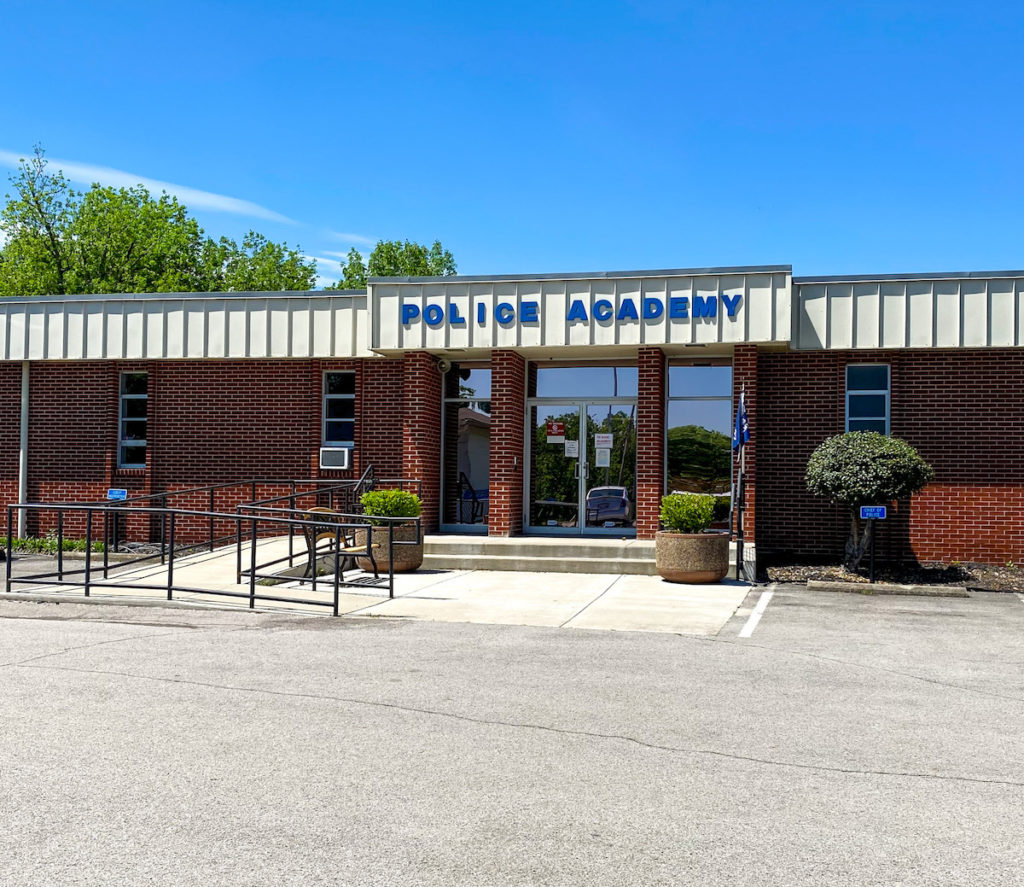
Karen Hunt Ahmed is just the type of person many police departments say they want to recruit these days: an avid runner with a black belt in karate and multiple advanced degrees.
But when she applied to Nashville’s police department, she was 51 years old, with no prior law enforcement experience. As a white woman, she was also in the minority in a department that is almost entirely male.
“I thought, you know, I’d actually be an asset to this environment, because I’m pretty tough,” she says. “But also I have kind of the background that might make a difference. I might not make some of the assumptions that get police officers in trouble.”
Still, the black belt and book smarts only her got her so far. Hunt Ahmed never made it through her first week at the academy. On her second day, she became one of about 1,000 recruits who didn’t complete their training at Nashville’s police academy in recent years. An analysis by WPLN News and the investigative reporting center APM Reports finds that women and people of color dropped out at the highest rates.
More: Learn how we reported this series.
Research shows those officers tend to use force less often than their white, male co-workers, and that they can help to build trust with residents who aren’t used to seeing officers who look like them.
Then why are so many of those recruits failing their training courses? Or flat-out giving up before they even make it to patrol?
“They said they wanted diversity,” Hunt Ahmed says. “But maybe they don’t want it as much as they think they did. Or maybe they don’t know that adding diversity to your force means that you have to maybe look at your force in a different way.”
‘I can be one these new kind of police officers’
A few years ago, Hunt Ahmed considered herself a “suburban housewife” as she pursued a Ph.D. at the University of Chicago. Nothing about her life hinted at a career in law enforcement.
Except this one thing. A little idea that would pop into her head while she was cooking dinner for her family after a long day of classes.
“It sounds kooky, but I would watch ‘Law & Order’ and think, that, like, first of all, it’s really cool to be a detective,” she says. “And second of all, that’s exactly what I’m doing in my Ph.D. work, which is learning to ask questions, follow clues, make connections.”
Hunt Ahmed thought her background in social psychology would make her a good candidate for a profession struggling to build trust. She had studied the biases that law enforcement has been trying to root out of its ranks. Plus, she was in good shape.
For a while, it felt like an unrealistic dream. But then Hunt Ahmed got divorced and lost her job. So, the Nashville native decided to apply to her hometown police department.
 Courtesy Karen Hunt Ahmed
Courtesy Karen Hunt Ahmed Karen Hunt Ahmed takes a mirror selfie while trying on her police uniform before starting at the academy in 2018.
After nine months of interviews, physical exams and even a psychological evaluation, MNPD accepted Hunt Ahmed into the academy in 2018.
“I can be one these new kind of police officers that everybody’s talking about,” she thought.
Hunt Ahmed didn’t expect training to be easy. But she didn’t realize just how high the odds were stacked against her.
Data suggest women and people of color seem to have a harder time at the academy.
WPLN News and APM Reports reviewed 10 years of MNPD data and found that between 2011 and 2020, white men graduated at the highest rate, at 83%. Men of color finished their training about 70% of the time. Women of all races graduated only about 60% of the time. The completion rates were lowest for women of color.
To try to understand the disparities, reporters parsed through hundreds of exit reports for cadets who didn’t complete their training. It’s hard to pinpoint any one reason for these high dropout rates.
Some got injured, failed their law classes or cited “personal reasons.” But in one report after the next, recruits mentioned the stress.
“Trainee Valentine stated that he did not think he was prepared mentally to complete the training program,” one report read.
“Trainee Rodriguez Lima stated he was not mentally prepared for the academy,” academy staff said in another.
“Trainee Thomas said she had a lot of anxiety the first day and when it did not go away, she knew this wasn’t for her,” instructors wrote.
That stress stems from the academy’s boot camp atmosphere. There is running and push-ups and bear crawls. Instructors yelling commands. Any minor infraction can lead to public humiliation. And this all starts in the first week.
In the opening scene of a promotional video the police department released a few years back, a drill sergeant paces back and forth. In front of him, a few dozen police recruits stand shoulder to shoulder, heads shaved and dressed in suits.
“We pride ourself here at the academy on integrity and professionalism, and we demand it from you,” the instructor barks.
The instructor warns the cadets that the months ahead will be tough.
“The only easy day was yesterday,” he tells them.” You know the rules. We went through it. You better start abiding by ’em or you will pay.”
‘You’re not even a civilian anymore’
“When you’re trying to create all that discipline, you can create too much conformity,” says Norman Conti, a sociologist at Duquesne University. He has been studying police culture since the 1990s.
The researcher once wanted to be an officer. But then Los Angeles police beat Rodney King on camera when Conti was in college.
Instead of joining law enforcement, he set out to understand how police became this separate group that felt so far apart from the community.
Conti says that divide is intentionally bred at the academy.
“While everyone else is running away from gunfire or running away from trouble, you’re running towards gunfire. You’re running towards trouble,” he says. “That’s not what a normal person does. You’ve made this choice.”
Conti says this harsh treatment of recruits is how many departments teach cadets what they think it takes to be a police officer. It’s a process he calls “degradation,” and it’s commonly used in the military, fraternities, even gangs. First, you beat people down, tell them they’re worthless.
“You’re a recruit,” Conti explains. “You’re not a police officer. You’re not even a civilian anymore.”
Then, gradually, he says, you build them up, as a unit.
“As the police academy begins and starts to move, they start to adapt and adopt more and more the paramilitary structure, the paramilitary standards,” Conti says. “And as recruits show that they can live up to those standards, that they can follow those standards, then they’re treated better.”
Hunt Ahmed says that, as a social psychologist, she figured the cadets would be pushed to their limits, both to train for the job and to bond as a group.
“I do know that some people think that is how you build cohesiveness in a kind of paramilitary organization, ” she says. “And I don’t love that. But I knew that it wouldn’t break me, either.”
‘Did they want to me to break down?’
Hunt Ahmed didn’t mind being yelled at. But just hours into her training, she started to feel like she was being singled out. She says the instructors called her “lazy” and “fat,” that they told her to go home and watch “The Price Is Right” or “Dr. Phil.” No one seemed to be saying that to the cadets in their 20s.
“They want to make things difficult,” Hunt Ahmed says. “Did they want me to cry? Did they want me to break down? I don’t know. But I didn’t.”
Hunt Ahmed thought she could handle the stress. She didn’t feel like she was struggling with the physical drills any more than the others.
But she says the instructors got mad when she asked questions. In an exit report, they accused her of rolling her eyes and interrupting training staff. They said she pushed an instructor. That she was disrespectful.
“And the next thing I know, I’m in the captain’s office,” Hunt Ahmed says.
She remembers an instructor telling her: “I’ve been disobedient and not doing what they asked and I have a bad attitude and that I need to resign.”
Hunt Ahmed denied the allegations. She said a film crew had been recording her all day, and she asked to review the footage. But she says the staff wouldn’t let her. Instead, they said she could quit or be terminated.
“And I said, ‘Well, I’m not going to resign,'” she recalls. “And then they said, ‘OK, we’re firing you.'”
So, she was gone, and it wasn’t even the end of the first week.
Hunt Ahmed was confused. The department had spent so much time and money to recruit her. She had left behind her teenage daughter, moved hundreds of miles and upended her life to join the force.
She wanted to learn. To do better. To be part of a new, more diverse generation of officers. But the academy wasn’t willing to give her another chance.
“The police — what do they want?” she’s still asking herself, more than three years later. “I’m the person they say they want. But then they get rid of me immediately.”
Hunt Ahmed has sued the city for federal age discrimination. Police referred WPLN News to the city’s legal department, which said it couldn’t comment on the details of the case while it is pending in court.
“That said, Metro disputes Ms. Ahmed’s version of the events and is confident in its defenses,” a city attorney wrote in an email.
But Hunt Ahmed hopes her lawsuit will push the department to rethink its approach to recruitment. After her experience at the academy, she wonders just how committed MNPD is to diversity.
This is the first story in a three-part series WPLN News is publishing this week about racial and gender disparities in the Nashville police academy. It was produced in partnership with APM Reports. Curtis Gilbert, Will Craft and José Martínez contributed reporting.
 This story was produced as part of APM Reports’ public media accountability initiative, which supports investigative reporting at local media outlets around the country. Support also came from the Corporation for Public Broadcasting.
This story was produced as part of APM Reports’ public media accountability initiative, which supports investigative reporting at local media outlets around the country. Support also came from the Corporation for Public Broadcasting.

